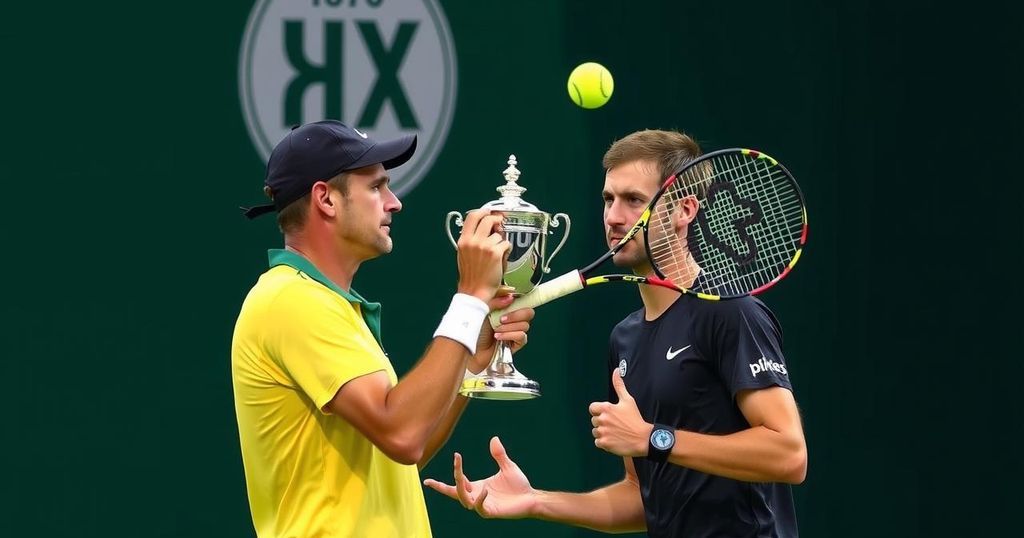Navigating Team Selection Challenges in the Davis Cup: Australia vs. USA
Australia narrowly defeated the USA 2-1 in the Davis Cup quarterfinal, showcasing the challenges of team selection. Captains Lleyton Hewitt and Bob Bryan made strategic decisions that influenced the match’s outcome, with Hewitt selecting Kokkinakis to excellent effect. The final doubles match sealed Australia’s victory, exemplifying the intricate dynamics of team preparation and match strategy in high-level tennis competition.
The recent Davis Cup quarterfinal match between Australia and the USA highlighted the multifaceted challenges of team selection within the competition’s knockout format. Australia emerged victorious with a narrow 2-1 win, securing the decisive doubles match at the Martin Carpena Arena in Malaga. Captains Lleyton Hewitt for Australia and Bob Bryan for the USA faced considerable pressure due to their selection choices amidst a backdrop of deep player benches, which amplified the stakes of this prestigious tie.
Hewitt selected Thanasi Kokkinakis for the opening singles match, while Bryan opted for Ben Shelton in a surprising debut, leading to a captivating showdown. Kokkinakis secured victory in a tightly contested match against Shelton, demonstrating resilience by saving four match points. Fritz subsequently leveled the tie by defeating Alex de Minaur, setting the stage for the crucial doubles match, which ultimately saw Australia’s pair of Matthew Ebden and Jordan Thompson triumph. This match not only showcased the attributes of individual players but also underscored the strategic intricacies of captaincy under the Davis Cup format, wherein prior knowledge of opposing team selections is limited until shortly before the contest.
The decisions made by both captains regarding singles and doubles lineups were somewhat influenced by strategic considerations and performances during practice. Bryan’s last-minute alteration of the doubles lineup, switching from his pre-designated pair of Ram and Krajicek to Shelton and Paul, aimed to leverage recent match play and synergy on court. In contrast, Hewitt’s confidence in Kokkinakis resonated through Australia’s selections, which eventually carried the team into the semifinal round.
As team dynamics and selections continue to shape outcomes, the implications extend beyond just wins and losses, involving an analytical approach to player conditions, matchups, and competition strategy. The high stakes of this quarterfinal effectively illustrate the complexities of team assembly in a tournament setting where captains must deftly navigate the intricacies of both analytics and instinctive decision-making in pursuing victory.
Reflecting on notable outcomes also illuminated how other teams navigated similar stormy waters. For instance, the case of Spain versus the Netherlands involved Spanish captain David Ferrer selecting Rafael Nadal, whose prior injury and limited match play raised questions regarding his effectiveness. Ultimately, the match result validated the unpredictability inherent in selection processes across tournament formats.
In summary, the ongoing discourse on team selection within high-stakes tournaments captures the delicate balance between strategic foresight and responsive adaptability that captains must harness. As evidenced in Malaga, every decision bears weight, forging narratives of triumph and learning alike for team captains and their players.
The Davis Cup is an annual international team competition in men’s tennis, bringing together national teams from around the world. With a unique format that evolves throughout the tournament stages, captains face the challenge of selecting players strategically for each tie, especially in the knockout rounds. Team selection becomes crucial as it not only impacts match outcomes but also involves predicting opponents’ choices under pressure. The recent quarterfinal match between Australia and the USA provided a vivid illustration of these complexities, highlighting the blend of tactical decision-making and player performance leading to success or failure in critical matches.
The quarterfinal encounter between Australia and the USA in the Davis Cup epitomizes the intricacies and pressures surrounding team selection in pivotal matches. With strategic decisions affecting not just match outcomes but also the morale and future prospects of the players, the ongoing dialogue surrounding selection processes is essential. As demonstrated, both triumphs and missteps underscore the necessity for captains to balance analytics and intuition, illustrating that in the realm of competitive tennis, every choice can carry significant consequences.
Original Source: www.arabnews.com








Post Comment